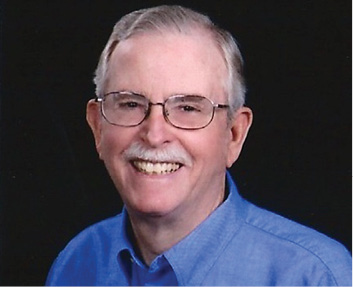Bill Heyck
Thomas William Heyck 1938–2014
Also known as Bill
Historian of Modern Britain
 Bill Heyck wrote about intellectual over-specialization, but he did not practice it. A professor of modern British history, Bill worked on Liberal politicians and Victorian intellectuals, freelance writers and redbrick universities, W. B. Yeats and E. P. Thompson, analytic philosophy and the history of golf, “four nations history” and “history from below.” He taught undergraduate courses on the Victorian crisis of faith, the conflict in Northern Ireland, and environmental thought, in addition to a survey of British history for which he literally wrote the book. His interests ranged more widely still, including the history of golf, the historical Jesus, and the Chicago Cubs—the latter he believed a communist plot, sapping the will from America’s heartland.
Bill Heyck wrote about intellectual over-specialization, but he did not practice it. A professor of modern British history, Bill worked on Liberal politicians and Victorian intellectuals, freelance writers and redbrick universities, W. B. Yeats and E. P. Thompson, analytic philosophy and the history of golf, “four nations history” and “history from below.” He taught undergraduate courses on the Victorian crisis of faith, the conflict in Northern Ireland, and environmental thought, in addition to a survey of British history for which he literally wrote the book. His interests ranged more widely still, including the history of golf, the historical Jesus, and the Chicago Cubs—the latter he believed a communist plot, sapping the will from America’s heartland.
Born in 1938 in Beaumont, Texas, Bill grew up in Florida but returned to Texas to attend Rice. He earned both his BA (1960) and MA degrees (1962) from Rice, where he also played tennis and joined ROTC. He served in the army from 1964 to 1966, earning the rank of captain, before returning to Texas to complete his doctorate under the direction of Standish Meacham at the University of Texas at Austin. Texas was where Bill met and married his wife of 50 years, Denis, a professor of Spanish language and literature. In 1968, Bill headed north to join the faculty at Northwestern. He published his first book, The Dimensions of British Radicalism: The Case of Ireland, in 1974, and Choice named his second book, The Transformation of Intellectual Life in Victorian England, an Outstanding Academic Book of 1982. This learned, controlled book charted the process by which leisured “men of letters,” sustained by the public for whom they wrote, were displaced by salaried academics, housed in the university and writing for specialists.
Bill’s career was decisively shaped by his encounter with the New Social History. He vividly recalled for graduate students the experience of reading Harold Perkin’s The Origins of Modern English Society, shortly after accepting his position at Northwestern. He had already written the lectures for his new British survey, organized around the political narrative in which he had trained. Perkin’s “total” history, however, convinced him to throw them all out and begin again from scratch. This conversion experience reverberated throughout his career: not only in The Transformation of Intellectual Life, a social history of intellectual life, but also in his subsequent recruitment of Perkin to Northwestern, and in his unsurpassed undergraduate textbook The Peoples of the British Isles: A New History (still in print, and now co-authored by his former PhD student, Meredith Veldman). Inspired by Perkin’s approach, in which high politics took its place within the larger social framework, Peoples was the first textbook in the field to treat Scottish, Welsh, and Irish history as more than ancillary to English history, and the first to focus on the evolution of British national identity. But perhaps the real strength of the book appears in Bill’s meticulous excavation of those strata where high culture and culture-as-lived-experience meet and social values form.
The Peoples of the British Isles attested to Bill’s commitment to undergraduate education – or, as he pointedly put it, scholarship. Just a year after he arrived on campus, Bill chaired the committee that established Northwestern’s residential college system. He served as faculty fellow of the Humanities Residential College from its foundation, and as its master from 1985 to 1989. In 1988, Bill chaired the fifty-member university task force charged with reviewing every curricular and extracurricular undergraduate program. The resulting “Heyck Report,” which offered an exhilarating (if largely, and regrettably, tabled) blueprint for the renovation of student life, grew out of Bill’s belief that a university is primarily an intellectual community. His own commitment to that idea was never in doubt, as the Council for the Advancement and Support of Education recognized in 1991 when it named him Illinois Professor of the Year.
Bill was a devoted graduate adviser, supervising nineteen dissertations. In a career that spanned more than four decades, saw the publication of four books, sixteen articles, and ninety reviews; and included terms as college master, department chair, associate dean, president of the Midwestern Conference on British Studies, and member of the editorial board of Albion and the Journal of British Studies, he maintained that “the teaching of teachers” was his most important work. He always made time for his students: every meeting was over lunch, often stretching nearly to dinner. Whenever students appeared at his door, Bill’s thundering welcome — “There she is!” — could make them feel as though he’d been sitting there all day just waiting to see them.
When Bill retired in 2007, he continued an active intellectual life, championing environmental causes and gun control while working on a cultural history of golf. He passed away in his Evanston home on September 7, 2014. Later that autumn, his family, friends, colleagues, and students gathered in the Vail Chapel to pay tribute to his life and career. They remembered a man with a clear moral compass and sharp sense of humor, who delighted in his family and, somehow, always had time to talk.
Guy Ortolano
New York University
Meredith Veldman
Louisiana State University
|
Revised from the February 2015 Perspectives on History |
